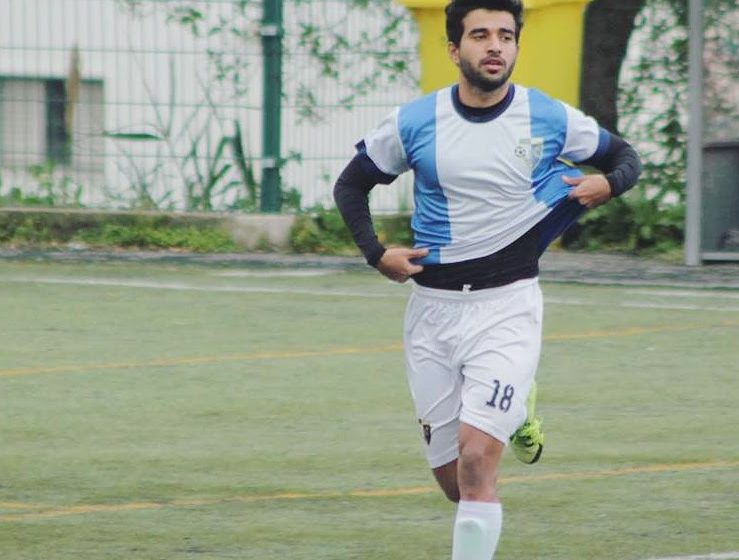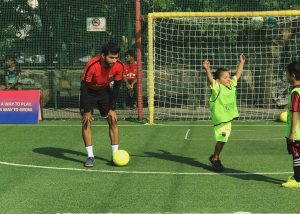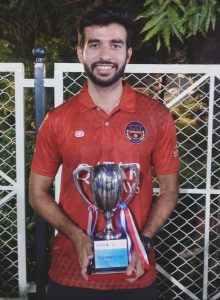Stronger scouting system with better infrastructure, facilities required: Moorjani

An AIFF C licensed coach, he works at the Kenkre Football Academy as head coach of the U18 and U12 I-League teams. Not this alone, he trains players in one-to-one or small group formats. And has played for Castelo Forte Club in Lisbon, Portugal on a year-long contract. A graduate from RD National College in mass media, he says his parents encouraged him to be as physically active as possible. Saurabh Tankha e-meets Mumbai-born Deep Moorjani who says his elder brother has had a big influence on him and his life during their growing up years.
When did you decide on becoming a football player?
Honestly, until the age of 10, I thought I wanted to become a cricketer. That’s when my brother started playing football and I followed. My school started football in the fifth grade so I played it in my colony until then. Some might say I was a natural as when my school PE teacher (we didn’t have a football coach) saw me play with my classmates for the first time, he told me to ask my parents to send me for football practice. I declined thinking it’s a paid thing and he said it’s sponsored by the school and wanted to make me the captain of the school team. I captained the school team for five years until I went to college. In my last couple of years at school, I think I knew that I wanted to become a footballer. It was when I started watching the Premier League that I realise that it was a career option and tried to imitate players like Steven Gerrard, Thierry Henry, Fernando Torres on the pitch.
What was your family’s reaction when you told them about your decision to take up a sport as profession?
My parents always let me make my own decisions. But I had to earn their trust by making sure I kept my academic scores in check. They said you could play all you want as long as you did your graduation as it was important I had a backup plan in case plan ‘A’ failed. I’ll always be thankful to them and my brother for their support.
What ails Indian football?
Mentality of coaches and the quality of coaching play a big role in developing top players. We need a stronger scouting system with better infrastructure and facilities. Kids who play for various clubs may at times need greater concessions from schools and colleges where sports, football especially, isn’t valued in the curriculum.
Parents and academic institutions should invest more in football and support the sport not just in terms of money, but also in terms of time and effort.
Why is it that Indian football has not been able to make a mark on world stage despite the facilities increasing manifold for players?
There have been changes in the structure but it’s only just the beginning. There’s still a long way to go and many more places for these new, improved structures to be implemented. It’s a long process, of course, and it’s bound to take time, but it’s going to play a big part in moving in the right direction.
You are a skills-coach who works with youth. Do you have a plan in place to ensure our country too produces world-class players?
What sets most top players apart is their technique, creativity and composure on the ball. In a one-to-one setting, I work a lot on the technique of players from a very young age to set a strong base which requires lots of repetitions and can’t always be worked on in a team setting. I’ve seen too many players who have the right idea but not the execution. Good decision-making is pointless without technical brilliance. There’s also a lot of focus on physical aspects like acceleration, speed, footwork, coordination, balance, and stability keeping in mind the rising physical demands of the modern game. Strength training is on the cards too with help from some top fitness trainers. However, football is a team sport and most of the training needs to be done with the team. Recently, the Indian National team coach Igor Stimac also stressed on the fact that India needs more creative players. And coaches play a big role in that.
Coaches need to create an environment where young players have the freedom to express themselves. Players need to be comfortable and not afraid to take risks. The priority should be individual development at the youth level instead of winning.
I like to measure my success as a coach by the amount of progress my players make and how many make it to top teams and not just the trophies the team wins.
You are currently taking the AFC B licence course. Let us know more about it.
The AFC B license course is the third level of coaching course in India. The first two levels focus more on the technical aspect of the game and youth football. As you go higher, the courses get more detailed — in terms of periodisation, physiology, and nutrition — and tactical and practical sessions get a bit more complicated. The course is divided into three modules of seven, seven and five days respectively with a two-month gap to work on things you’ve learned and prepare for the theory and practical tests. The AIFF is conducting as many courses as possible lately to produce more coaches and improve the quality of coaching in India.
How was your experience of playing a season in Portugal? How are the facilities different from our country?
I was 23 when I got scouted by a Portuguese coach for a 45-day long trial for a club called Castelo Forte in Lisbon, Portugal. I was fortunate to have been selected and offered a year-long contract. Language was a barrier early on and the game was faster and physical. That’s what made it a great learning experience. The players were technically at a higher level. Even though it was the district league, there were 32 games in the season, not to mention the cup games.
Nutrition was also a big factor. The quality of the food and what and how much you’re eating is focussed on from a young age. This means better prepared for physical demands of the game. Kids are exposed to the sport from a young age. I’d frequently see parents playing football with their two- or three-year-olds and teaching them the basics in parks and public football fields.
How difficult is it to work with the system (read bureaucracy) in India to bring out the best?
Bureaucracy happens everywhere, including FIFA. Yes, there are challenges and I won’t deny that but a lot of good work has been done at various levels in Indian football. I believe in working with what we have and making the most of it. This is where the true quality of a coach stands out. How you adapt to situations and still do the best job possible for your players is all that matters. I hope more people join Indian football, at various levels, to improve the game for the country rather than criticise the system from the outside.




